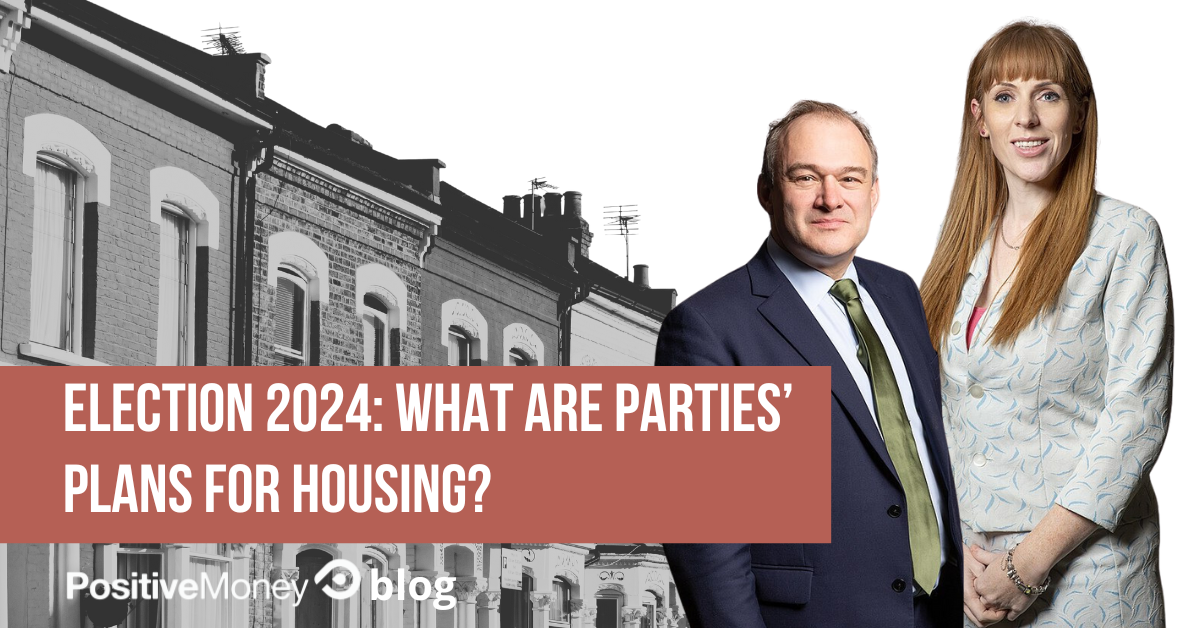
Finance and DemocracyUK
18 December 2025
In the run up to next week's general election, we look at the UK political parties’ housing policies, and if they’ll tackle the underlying financial drivers of the housing emergency.
Setting them apart from the other main political parties, the Green’s manifesto acknowledges just how high house prices are, and the fundamental role of treating homes as financial assets in driving this, stating that, “our national housing crisis is the result of 40 years of governments choosing to treat houses simply as assets rather than as homes”.
The Greens have not set an overall target for building new homes, focussing instead on social home building with a target for 150,000 new social homes a year, alongside a ‘Right Homes, Right Place, Right Price’. To meet their social housing target, the Greens would use a combination of new building alongside bringing long-term empty homes and privately-rented properties into council ownership. They would also end Right to Buy in full, to be replaced by a community right that gives local authorities, social landlords and community groups first dibs on buying certain privately owned properties at reasonable rates. Similar policies have been used successfully in cities across Europe, and as the New Economics Foundation have shown, are a great way to rapidly increase our decimated stock of social housing and prevent local councils from having to pay huge sums to private housing providers.
The Greens' offer for renters is the most ambitious out of all the main parties. They would be the only party to introduce rent controls - a desperately needed measure to address rapidly ballooning rents. Like Labour, the Conservatives and the Liberal Democrats, they pledge an end to no-fault evictions.
The Greens’ uniquely offer tax reforms that aim to address the financialisation of housing. They are pledging to update the UK’s vastly outdated Council Tax bands to reflect house price increases, with a long-term ambition to move towards a Land Value Tax to reduce the land speculation that drives high house prices. A wealth tax on assets above £10 million, alongside aligning Capital Gains Tax with income tax, could help to discourage multiple home ownership and property speculation.
Whilst the Greens are the only party to propose the re-introduction of Credit Guidance policies, which they would enact to direct bank lending towards the green transition, there is a strong case that this kind of much-needed coordination between monetary and fiscal policy should also be applied to target long-term, sustainable house prices.
Noticeably, Labour is the only party whose manifesto does not have a chapter dedicated to housing, with housing policies instead falling within broader policy areas of ‘driving economic growth’ and ‘breaking down barriers to opportunity’.
Labour’s housing offer focuses almost exclusively on building new homes, with a target of 1.5 million new homes over the next parliament and planning reform as the primary delivery mechanism. Labour have no target for social homes, and have not promised to increase funding for the government’s main programme for social home building. Welcome measures to protect our existing stock of social homes include reviewing Right to Buy discounts and increasing protections on newly-built social housing, but our dire need for social homes calls for more ambition, including scrapping Right to Buy altogether and funding councils to both build new and purchase existing housing stock.
For renters, Labour’s commitment to end no-fault evictions, empower renters to challenge unreasonable rent increases and the more recent announcement to ‘end bidding wars’ are welcome, but it’s unclear how these would work in practice. What’s more, rent control policies - like those in place in the UK until the 1980’s - would likely be a better tool to provide genuine security to tenants given that rents are ballooning and tenants in desperate need of housing are less likely to challenge landlords.
Though Labour proposes a 1% increase of stamp duty for international buyers, the small scale means this is unlikely to prove a significant disincentive to speculation. And far from addressing the financial drivers of our housing crisis, Labour would introduce a permanent mortgage guarantee scheme for first time buyers. Such a policy could counterintuitively pull homeownership even further out of reach by providing public backing for banks’ to create new money to drive up house prices. Labour also emphasise a commitment to keeping mortgage rates “as low as possible” but as we’ve shown, the low interest rates after the 2008 financial crisis contributed to making homes unaffordable by making it easy for people to borrow money to invest in housing, as well as making housing a more desirable investment as interest rates given on savings are low. This has left us locked in a boom-and-bust cycle with people double-hit by high mortgage rates on top of high house prices when the Bank of England raises interest rates like it has in the recent period.
The headline figure for the Conservatives is a plan to build 1.6 million homes across the next parliament, an increase on Labour's 1.5 million through relaxing environmental and planning regulations. With no reference to increasing social homes, the Conservatives wrongly scapegoat migrants as being responsible for our dearth of council homes, proposing implementing tests to require a Local or UK connection for social homes, and to make it easier to evict social tenants on grounds of ‘anti-social behaviour’. Targeting minoritised groups is not only immoral, but is likely unworkable.
The Conservatives pledge to finally pass the Renters Reform Bill to scrap no fault evictions, a 2019 manifesto promise that they failed to enact after the Bill was watered-down and scrapped in the final days of the last government.
They would take measures to increase homeownership, most prominently, through introducing a new Help to Buy scheme, the previous iteration of which drove up house prices so much that the overall cost of the scheme outweighed the benefit of the subsidy to home buyers, with most of the public money spent ending up in the pockets of developers.
The Lib Dems have the most ambitious house building target: 380,000 new build homes a year, 40% of which would be social homes. They would give local authorities the right to end Right to Buy, yet would introduce a ‘Rent to Own’ model for social homes where rent payments contribute to tenants owning a property outright after 30 years - it’s unclear what the impact of this combination would go towards protecting social housing stock which Right to Buy decimated.
The Lib Dems are committed to ending no-fault evictions alongside all parties’ other than Reform, with other small measures for renters including extending the default length of tenancies to three years, and creating a national register of licensed landlords.
Notably, the Lib Dems would enable councils to disincentivise second home ownership through a fivefold increase in the level of council tax local authorities are able to levy on second homes (from 100% to 500%) alongside a stamp duty surcharge if these are bought by international buyers. This would be a positive move towards a fairer tax system that also promotes a more efficient use of our housing stock. The Lib Dems also propose reforming Capital Gains Tax to make it higher and more progressive, but the manifesto is absent of targeted tax reforms to explicitly disincentive home speculation and landlordism.
Planning reforms and tax incentives for development are the Reform Party’s main proposals to increase housing stock. Like the Conservatives, Reform proposes attempting to reduce demand for social homes by prioritising ‘local people’, with harmful anti-migrant rhetoric. Our stock of social homes has been decimated by policy decisions, not by migration, so these measures are not only dangerous rhetoric but also ineffective.
Reform would abolish the Renters Reform Bill, instead opting for boosting the ‘monitoring, appeals and enforcement process for renters with grievances’. Instead of addressing the dire situation for renters, who are clearly not a priority for Reform, they would encourage landlordism with tax incentives for smaller landlords.
Sign-up to our mailing list for regular updates on our work fighting for a money and banking system that enables a fair, sustainable and democratic economy.
